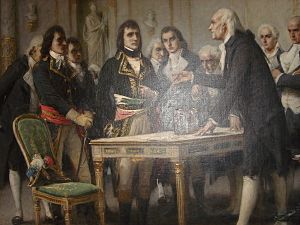Volta Prize facts for kids
The Volta Prize (French: prix Volta) was a special award created in France in 1852. It was named after Alessandro Volta, an Italian scientist who invented the electric battery. The prize was started by Napoleon III, who was the Emperor of France at the time. It was given to scientists from anywhere in the world who made amazing discoveries about electricity. The winner received 50,000 French francs, which was a lot of money back then! A group of smart scientists from the French Academy of Sciences usually chose the winners.
Some famous winners included Heinrich Ruhmkorff, who made a better induction coil, and Zénobe Gramme, who invented the Gramme dynamo and the first useful electric motor for factories.
One of the most well-known awards was given in 1880 to Alexander Graham Bell. He won the Volta Prize for inventing the telephone. Famous writers like Victor Hugo and Alexandre Dumas, fils were even on the committee that decided the winner! Alexander Graham Bell used his prize money to start new places in Washington, D.C.. These included the Volta Laboratory Association in 1880, which was an early version of Bell Labs. He also created the Volta Bureau in 1887, which later became the Alexander Graham Bell Association for the Deaf and Hard of Hearing (AG Bell).
The Volta Prize was stopped in 1888.
Contents
Why the Volta Prize Was Created
The First Electricity Prize

The idea for the Volta Prize came from an earlier award called the Galvanism Prize. This prize was created by Napoleon Bonaparte (Napoleon III's uncle) in 1801. It offered a huge prize of 60,000 francs for discoveries like those made by Volta and Benjamin Franklin. However, no one ever won the main prize.
Only four scientists received a smaller award of 30,000 francs from the Galvanism Prize:
- 1806 Paul Erman
- 1807 Sir Humphry Davy
- 1809 Shared by Joseph Louis Gay-Lussac and Baron Louis Jacques Thénard
Napoleon III's Love for Science
Louis-Napoléon Bonaparte, who started the Volta Prize, was very interested in electricity himself. He even showed his own type of voltaic pile (an early battery) to the French Academy of Sciences in 1843. His battery was made from one metal and two different acid liquids.
How the Prize Worked
The rules for the Volta Prize were set by Napoleon III in Paris on February 23, 1852. Here are the main points:
- Rule 1: A prize of 50,000 French francs would be given for new ways to use the voltaic pile. This included uses in factories, lighting cities, chemistry, machines, and medicine.
- Rule 2: Scientists and inventors from any country could enter the competition.
- Rule 3: The prize would be available to win for five years.
- Rule 4: A special committee would be set up to look at each invention and decide if it met the rules.
- Rule 5: French government ministers were in charge of making sure these rules were followed.
The 50,000 francs prize money was worth about $10,000 US dollars at that time. This was more than five times what a professor in Paris earned in a year! Some famous scientists on the committee included Edmond Becquerel and Jean-Baptiste Dumas.
Who Won the Volta Prize?
Here are the winners of the Volta Prize:
- 1858 No main prize was given. But special medals were awarded to Heinrich Ruhmkorff, Paul-Gustave Froment, and Duchenne de Boulogne.
- 1863 Heinrich Ruhmkorff won for making the Ruhmkorff coil better.
- 1871 No prize was given this year.
- 1880 Alexander Graham Bell won for inventing the telephone. A smaller prize of 20,000 francs was also given to Zénobe Gramme.
- 1888 Zénobe Gramme won for his hard work in creating and improving the continuous-current dynamo.
Other people also received smaller awards for their work. These included Paul-Gustave Froment for his electric motor, Auguste Achard for an electric brake, Gaetan Bonelli for an electric loom, David Edward Hughes for a printing telegraph, Giovanni Caselli for the pantelegraph, Victor Serrin for his lighting system, Leopold Oudry for galvanoplasty, Duchenne de Boulogne for using electricity in medicine, Gaston Planté for a new type of battery, and Ernest Onimus for his research on electric currents.
See also
- Alexander Graham Bell honors and tributes
- Edison Volta Prize
- List of physics awards
 | Dorothy Vaughan |
 | Charles Henry Turner |
 | Hildrus Poindexter |
 | Henry Cecil McBay |

